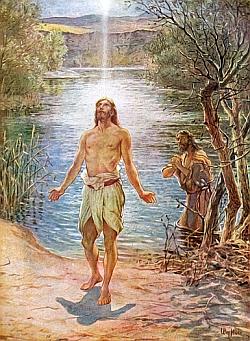 What people think about Jesus will reflect in their pneumatology, their ideas concerning the Holy Spirit. As a result, what is taught concerning where Christ and the Holy Spirit intersect often becomes wildly divergent.
What people think about Jesus will reflect in their pneumatology, their ideas concerning the Holy Spirit. As a result, what is taught concerning where Christ and the Holy Spirit intersect often becomes wildly divergent.
1. Some believe Jesus performed His miracles through His divine nature. Because He was God, he could raise the dead, heal, and command nature.
2. Some believe Jesus performed His miracles solely through His human nature, as a man fully empowered by the Holy Spirit.
What people believe about Jesus as the God-Man is largely interpreted through this lens:
Have this mind among yourselves, which is yours in Christ Jesus, who, though he was in the form of God, did not count equality with God a thing to be grasped, but emptied himself, by taking the form of a servant, being born in the likeness of men.
—Philippians 2:5-7 ESV
What “emptied himself” means becomes problematic for everyone. Is is possible that this verse forces people to rely on their conceptions of pneumatology to reason back to how Jesus did His miracles?
People who believe Jesus performed miracles through His divine nature are far less likely to believe that the charismatic gifts of the Spirit are for today, whereas those who believe He did miracles through His Spirit-filled human nature more likely will embrace a position that what Jesus did Spirit-filled people can do because the Holy Spirit, being God, is immutable and timeless.
The swing verse:
“Truly, truly, I say to you, whoever believes in me will also do the works that I do; and greater works than these will he do, because I am going to the Father.
—John 14:12 ESV
Which couples with this:
Nevertheless, I tell you the truth: it is to your advantage that I go away, for if I do not go away, the Helper will not come to you. But if I go, I will send him to you.
—John 16:7 ESV
Jesus’ ascending to heaven resulted in His sending the Holy Spirit, and now people can do greater works.
Those “greater works” also split people based on pneumatology. Are they greater by nature? Or are they greater in number? Or both? How people understand this will also determine how their Christology and pneumatology intersect and inform each other.
But Jesus walked on water and commanded the wind and it obeyed. Surely this is due to His divinity and not anything men can do, even Spirit-filled men.
Jesus says this about faith, which is also one of the nine gifts of the Spirit:
“For truly, I say to you, if you have faith like a grain of mustard seed, you will say to this mountain, ‘Move from here to there,’ and it will move, and nothing will be impossible for you.”
—Matthew 17:20 ESVb
Where do I stand on this? I believe that as one delves deeper into the Scriptures it becomes clear that Jesus elected to do His miracles as a Spirit-filled man to show what is possible for anyone who believes. This is a hallmark of those who are part of the Kingdom of God, or as Jesus said, “Nothing will be impossible for you.” And it is as Jesus said because He modeled for us what a truly Spirit-filled man can do, not relying on His nature as the Son of God to do these things, which would be impossible for us to emulate, but instead relying on his mantle as the Son of Man and the Last Adam (1 Corinthians 15:43-49).
What we believe about Jesus informs how we think about the Holy Spirit. And vice versa.
